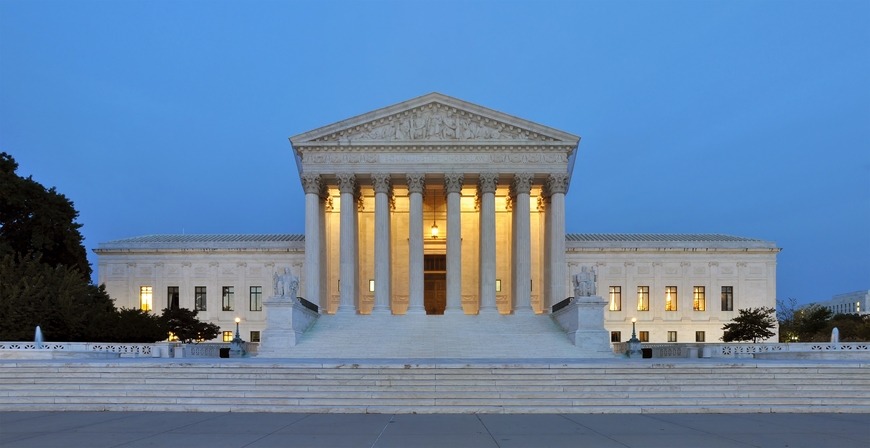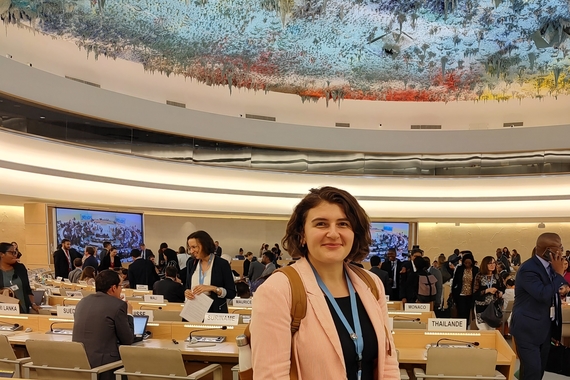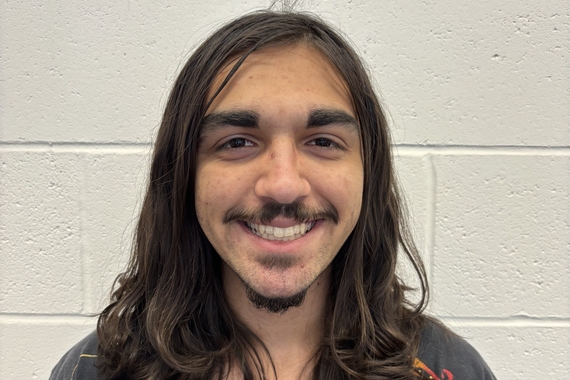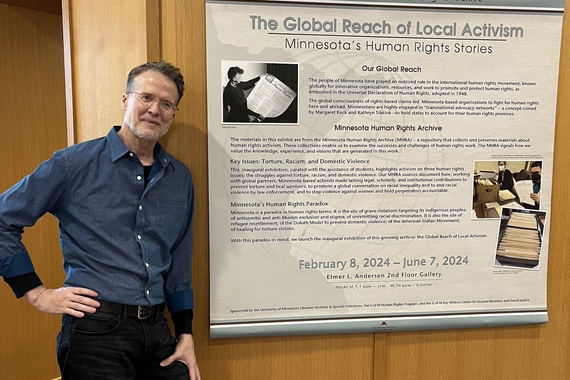Elevating Marginalized Voices
The Master of Human Rights Degree Program strongly believes in the importance of integrating professional experience with academic knowledge in the field of human rights, making internships one of the central aspects of the program. Many students, despite challenges posed by the spread of COVID-19 and challenges related to working in the field defending human rights, succeeded in doing amazing work with their host organizations. In this Q&A series, we interview our students to learn more about their experiences. In the third Q&A of the series, we are joined by Bassel El-Mrawed, a second-year Master of Human Rights (MHR) student.
Human Rights Program (HRP): Can you tell us more about your educational background, specifically at the University of Minnesota, and your professional experience? How did both contribute to your decision in choosing this particular internship and the host organization?
Bassel El-Mrawed (BEM): After a fruitful undergraduate experience at the American University of Beirut and a year-long exchange program to Denmark and Germany, I really wanted to expand my expertise so that I could give back to the many communities that are near and dear to my heart. This journey took me to Minnesota as a Fulbright scholar and a Master of Human Rights student. For the past year, I have had the privilege to study a field I am so passionate about alongside a vibrant group of hard-working professionals that are not only my colleagues but have become my close friends. I tailored my courses to get experience in management, quantitative studies, grant writing, and policy analysis. I had the chance to expand my knowledge outside the classroom by taking part in a research project with the Human Rights Program and the United Nations where I sharpened my qualitative research skills and learned about protection networks and human rights defenders.
Getting those skills and knowledge was enriching, and I wanted to continue to learn more and expand my experience outside academia. So in the summer of 2021, I moved to Washington D.C. to become a Policy and Political Affairs Intern at the Human Rights Campaign (HRC). There, I was part of Project One America, a regional project that aims to elevate the rights of marginalized minorities in the American South. My work with HRC increased my knowledge of human rights and social justice in the US, NGO management, as well as community outreach and organization.
(HRP):Please describe your summer internship, the host organization, your role in that organization, and the projects you worked on?
(BEM): As part of HRC’s Project One America (POA), I assisted in community outreach, event planning, and research projects across the Southern states of Alabama, Arkansas, Mississippi, and Texas. I had to work closely with the state organizers across these different states which meant that I had to learn the political, cultural, and social contexts of each of the communities I worked with.
In Arkansas, I researched grants for grassroots organizations in underserved communities. I also assisted in the development of guidelines and frameworks for a consortium of organizations seeking to help individuals living with HIV in Arkansas. As part of this initiative, I researched public health projects and relevant policies and laws, contacted government officials, and created social media outputs and posts to raise awareness about HIV. In Texas, I co-chaired information sessions on voters’ rights and raised awareness on harmful policies and resolutions that were voted on in Texas's first and second special legislative sessions. I also attended multiple meetings at the senior level, where I learned about the US state legislature from experts in the field. In Mississippi, I conducted research on state legislation and co-chaired multiple information sessions including a legal webinar for will-writing assistance and a telehealth access panel. In Alabama, I conducted event planning and co-chairing of more than 4 events including webinars, information sessions, and virtual phone banks. The most successful event was an information session webinar on education and job training for underserved communities. I took charge of the entire event, I researched free GED course providers, set up and led meetings between HRC Alabama and the Alabama Community College System (the largest and most influential of the providers), helped create the content, conducted phone banks to recruit attendees, and co-chaired the webinar. Through hours and hours of community outreach and engagement, I was able to exceed turnout expectations for this and all other events.
In addition to working with all 4 states, I worked with the central POA leadership and assisted other branches of HRC. For instance, I attended a demonstration against a Supreme Court decision that created discriminatory barriers in adoption. I also got to learn about the US policy, politics, and legislative system through the Policy and Political Affairs Board meetings attended by representatives from all states.
(HRP): How did the internship add to your professional experience and personal growth? And how do you see it impact your career trajectory?
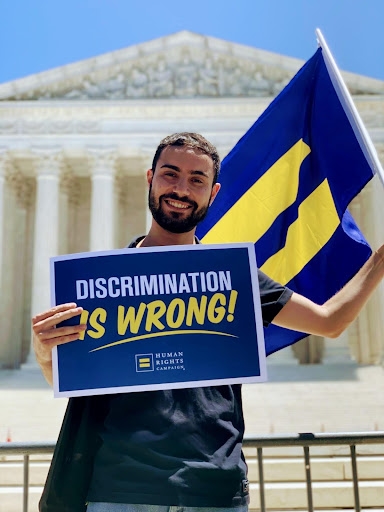
(BEM): Working with HRC opened my eyes to the rich, vibrant culture of the South. Project One America works within an area whose people are wrongfully categorized as deeply conservative, unaccepting, and backwards. In reality, the people living in these areas are caring individuals who are altruistic and socially driven. Working with HRC to correct these misconceptions has been eye-opening. The South is usually seen as one big place instead of a mosaic of communities that are unique and diverse. I got to learn a lot about the culture and meet the people and activists who are on the ground. While doing so, I got to see a lot of parallels in misconceptions between the South and Lebanon, where I come from. Lebanon is also generally perceived as a scary place made up of only unaccepting and close minded people. I am grateful for the opportunity to learn lessons that I will utilize to correct misconceptions in my journey in uplifting the voices of marginalized communities.
The work itself was also very rewarding. Juggling multiple projects across 4 states while coordinating with the central POA team in a fast paced environment strengthened my communication skills and helped me become a well-rounded multitasker. I was able to work with a great team of experts who were not only willing to teach me but also eager to hear my opinion and perspective. I got to learn a lot of new skills in fields I never saw myself taking part in. I am proud to say that I can now confidently partake in event planning, outreach, and project management.
(HRP): Doing an internship as an international student during Covid-19, and working with marginalized communities can be very challenging. What were the main challenges you faced during your internship on both a personal and a professional level? And how did you overcome them?
(BEM): This internship was a new and entirely different experience than any work I have ever done before. Moving to DC to work in policy, legislation, and community outreach intimidated me. While I had extensive campaigning experience, I never delved into engagement and retention. I remember the first time one of my supervisors assigned me to do phone banking. I had never done that before, I was really scared of saying the wrong thing or not knowing how to respond to questions I would get. I got anxious at the thought of calling individuals to ask them to come to our events, volunteer with us, or donate to our causes. At first, I was really hesitant to even start this task, I even considered thinking of excuses to get out of it. However, I voiced my concern to my supervisor, who kindly guided me through the process. He walked me through what I am supposed to do and say and how to say it. After a couple of times practicing on my own I felt confident enough to try my first call and it went really well! Throughout my internship, I made more than 450 calls across the region, I honestly never imagined I would even reach half that number. Phone banking ended up being a good experience that I am happy to add to my list of expertise.
(HRP): In your internship with the host organization, you took on new and different roles. How did you manage to adapt to your new job description? And what are your recommendations for other students, especially international students, on how to adapt to new roles in a US context?
(BEM): Adapting to new work environments and new fields can be challenging, especially when studying abroad. Like many other international students, I faced this difficult situation as well. As part of my job description, I had to work within the realm of US politics. Getting accustomed to US legislation was a new challenge. As a foreigner, I have the knowledge of Lebanese or Venezuelan systems but I did not have the experience my American peers and coworkers have when it comes to law, politics, and US history. During the first staff and team meetings, I would lag behind everyone else because I could not understand some words, did not know what an acronym stood for, or did not have the context or knowledge of various legislative and political systems and jargon. It felt like I was missing a lot of points during meetings because I had to do side research while everyone else was talking. I felt so bad and even thought that maybe I did not deserve to be in that internship, that maybe someone with more experience on these systems would do a better job than me. However, I continued working and learning more and more with each passing week. I got the hang of it as I attended more meetings and asked my supervisor questions. I would take time to research and ask my peers, classmates, fellow interns, and supervisors for clarification. Eventually, I became more adept and knowledgeable with the context. I left the internship learning the behind-the-scenes priceless information that comes from policy and political affairs work.
If I could give anyone advice when starting a new internship it would be to step out of your comfort zone and to be open and communicative with your coworkers. At the same time, I would recommend being patient and kind with oneself: we are where we are because of our hard work and intelligence, you deserve to be where you are! Take advantage of the chance to learn new skills in an environment made for fostering growth. Don’t be afraid to ask questions, internships are opportunities for growth and chances to learn new skills.
